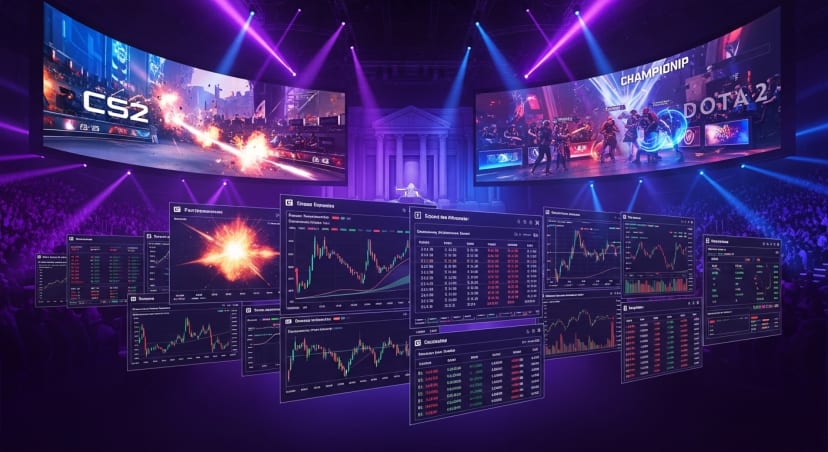Esports Offseason Shockers: Real Betting Examples That Moved the Market

In esports, the offseason refers to the period of downtime between official tournament cycles, when top-tier leagues pause, rosters are reshuffled, and teams regroup and reassess their strategies. Unlike traditional sports, these breaks aren’t always clearly defined or consistent across titles. For games like League of Legends or Dota 2, the offseason typically begins in the summer, while CS: GO and Valorant may follow different rhythms. This period may seem quiet, but it’s when major behind-the-scenes shifts happen, and those changes can heavily impact betting markets before the next match is even played in the UK.
When top-tier tournaments go quiet, you’d expect betting activity to cool down too. But the esports offseason creates a different kind of opportunity, and risk. With fewer matches and shifting team dynamics, both odds and UK bettor behaviour change dramatically.
If you’re planning to bet during the slower months, it pays to understand how bookies react, how punters misstep, and how to spot value where others don’t for UK esports.
Why Esports Offseasons Matter for UK Bettors
Most major esports titles operate on cyclical schedules. League of Legends has its mid-season break and offseason shuffle before the World Championship. Dota 2 teams regroup and rebuild ahead of the International qualifiers. CS2, Valorant, and others follow similar patterns, with fewer official matches and more roster experimentation during the summer months.
During these periods, the scene slows down, but betting doesn’t disappear. In fact, the lack of structure can lead to softer lines, making it easier for sharp bettors to find mispriced matchups. At the same time, bookmakers face challenges in adjusting odds accurately when data becomes scarce or unreliable for UK players.
What Happens to Odds When the Esports Calendar Empties?
When competition drops off, odds become less stable. Without regular tournament play, bookmakers rely on old performance metrics, rumours, or incomplete scrim data to set lines. This often leads to:
- Greater disparity between bookmakers
- Overweighting of brand names and past results
- Delayed reaction to roster announcements or patch effects
A strong team that’s recently lost a key player might still be priced as a favorite, while an up-and-coming roster might remain undervalued due to a lack of exposure. These are the moments where value can be found, if you know what to look for.
Bettor Behavior in the Offseason: Opportunity Meets Overconfidence
The offseason attracts two types of bettors: cautious observers and overconfident chasers. While some step back until the scene stabilizes, others dive into speculative markets hoping to exploit less efficient lines.
Common pitfalls include overreacting to scrim results, misjudging meta changes, and placing bets based on outdated assumptions. Friendly matches and low-stakes qualifiers often mask a team’s real form or intentions.
But there’s a flip side. Bettors who follow team news closely, tracking contract extensions, coaching changes, or even visa issues, can find real edges before sportsbooks adjust their odds. This is where offseason research pays off.
| Offseason Opportunity | Associated Risk |
| Mispriced odds from roster changes | Roster moves not yet finalized |
| Books are slow to adjust to meta shifts | Betting too early on unstable metas |
| Fewer sharp bettors in the market | Overconfidence in weak signals |
| Early info from team news & leaks | Fake news, scrim bait, misinformation |
Case Examples: When Summer Shocked the Markets
Offseason betting isn’t just theory; it’s produced real, market-shifting surprises across major titles. Here’s how volatility played out in League of Legends, Dota 2, and CS2 during summer breaks, and how sharp bettors either exploited the moment or got blindsided by it.
League of Legends – Roster Chaos Before Worlds
The League of Legends offseason has a well-earned reputation for last-minute roster shuffles. One notable example occurred during the Worlds play-ins, where a top-seeded team replaced its starting ADC just days before their first match. The news broke late, and sportsbooks didn’t adjust quickly; the team’s odds remained short for hours. Bettors who spotted the change on social media or regional forums were able to fade the favorite before the books reacted, catching a mispriced underdog with far better form. Within 24 hours, the odds flipped, and so did the result.
Dota 2 – Patch Whiplash Before Regional Qualifiers
In Dota 2, timing is everything, especially when it comes to patches. Before a recent round of the International qualifiers, Valve dropped a significant patch that altered hero balances, item viability, and overall pacing. Favored teams that had dominated the previous meta struggled to adapt, while underdogs with flexible drafting surged. One high-profile upset involved a team that had a 2% pick rate hero become meta overnight, something their coach had anticipated. Bettors still relying on pre-patch data were caught off-guard, while those tracking patch notes and scrim whispers found huge value.
CS2 – Meta Tweaks and the Upset Window
During a summer testing phase, CS2 introduced tweaks to weapon pricing and subtle CT/T-side balancing changes. These adjustments created temporary imbalances, particularly on specific maps such as Mirage and Inferno. Well-prepared teams capitalized on the new dynamics, while more established lineups, locked into old defaults, floundered. One underdog team achieved a five-match win streak against higher-ranked opponents simply because they adapted more quickly. Bettors who jumped in early on form and map-specific data profited, but those relying on HLTV rankings alone missed the shift entirely.
How to Bet Smarter During the Offseason
It’s not about betting more, it’s about betting better. If you’re active during the offseason, stay methodical.
Start by monitoring Liquipedia for roster movements and tracking credible sources on Twitter or Reddit for player updates. Compare odds across multiple sportsbooks to catch early mispricings. Don’t overreact to showmatches or exhibitions, teams often treat them as practice, not as a true competition.
Most importantly, adjust your expectations. Fewer matches mean fewer reliable signals. Focus on learning rather than overcommitting your bankroll.
Final Word: Less Action, More Insight
The offseason isn’t dead time. It’s a different time. Markets get softer, narratives change faster, and information becomes the most valuable currency.
If you want to stay active, slow down, observe more, and pick your spots carefully. Esports rewards those who understand momentum, but it also punishes those who confuse volatility with opportunity.
In the summer, patience often prevails over prediction.
FAQ
What is the esports off-season and why is it important for betting in the UK?
The esports off-season is the period between major tournament cycles when leagues take a break, teams adjust their rosters, and strategies evolve. Unlike traditional sports, the timing of the off-season varies depending on the game. It's crucial for betting because these behind-the-scenes changes can significantly affect betting odds and create unique opportunities for informed punters.
How do betting odds fluctuate during the esports off-season?
With fewer official matches to analyse, bookmakers often rely on older data, rumours, or incomplete scrimmage results to set their odds. This can lead to volatile and inconsistent lines, overemphasising past performance and team reputations. Savvy bettors can exploit these mispriced opportunities.
Why is bettor behaviour during the off-season considered risky?
During the off-season, bettors often fall into two categories: cautious observers and overconfident chasers. Reacting excessively to scrimmage results, outdated information, or minor meta changes can lead to losses. However, bettors who focus on reliable team news and roster changes can gain an advantage before the bookies adjust their odds. Remember to gamble responsibly.
What common mistakes should UK bettors avoid during the esports off-season?
Common errors include placing large bets on showmatches or exhibitions that are essentially practice, misjudging the impact of roster changes before they are confirmed, and betting too early on unstable meta shifts or unreliable information. Always verify your sources.
How can bettors identify value bets during the off-season?
Closely monitor roster news, coaching changes, contract updates, and visa issues on reliable platforms like Liquipedia and social media. Compare odds across multiple UK sportsbooks to identify discrepancies where the market hasn't caught up with the latest developments.
Can you provide examples of off-season events that have impacted esports betting markets?
Yes. In League of Legends, a last-minute roster change before Worlds led to mispriced favourites. In Dota 2, a patch before qualifiers shifted hero viability, catching out bettors relying on outdated data. In CS2, summer meta tweaks created imbalances that sharp bettors exploited before bookmakers reacted. Always stay updated!
How should bettors in the UK approach betting during the esports off-season?
Prioritise quality over quantity. Monitor trusted sources, track roster and meta developments, compare odds across different sportsbooks for discrepancies, and avoid over-committing your bankroll based on limited or unreliable data. Patience and selective betting are essential. Remember to set limits and gamble responsibly.
What are the potential risks of betting during the esports off-season?
Risks include mispriced odds due to unfinalised roster moves, slow sportsbook adjustments to meta changes, and exposure to misinformation or 'scrim bait' designed to mislead bettors. Always do your research and be wary of unverified information.
What tools and resources can help with off-season esports betting?
Platforms like Liquipedia for roster tracking, Twitter and Reddit for credible insider updates, and odds comparison sites are invaluable for staying informed and spotting value. Esport Ranker is a great place to start.
What's the key takeaway for betting during the esports off-season?
The off-season offers fewer matches but increased volatility and potentially softer markets. Success comes from taking your time, prioritising research, identifying genuine value amidst the noise, and knowing when to act – or when to hold back. Patience is often more rewarding than impulsive betting during this period. Remember to gamble responsibly.
















